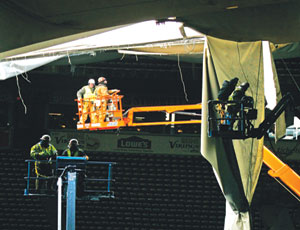The Minneapolis Metrodome, whose air-supported roof split under the weight of more than 17 inches of snow and ice on Dec. 12, won’t see any action at least until after Christmas.

The Minnesota Vikings moved their Dec. 20 National Football League game with the Chicago Bears to the University of Minnesota’s TCF Bank Stadium. Other Metrodome events through Dec. 23 have been canceled as crews replace and repair the Teflon and fiberglass panels.
Birdair Inc., Amherst, N.Y., which made and installed the roof, and Geiger Engineers, Suffern, N.Y., the system designer, sent in experts who declared it could not be repaired quickly.
Geiger is evaluating the structure with third-party engineers Walter P. Moore of Houston and Clark Engineering Corp. of Minneapolis.
The timeline and repair cost are still unknowns, said Steve Maki, director of facilities and engineering for the Metropolitan Sports Facilities Commission, the owner of the Metrodome stadium.
While the commission authorized $1.5 million for repairs last week, “no one expects that to cover the full extent of the damage,” said spokesman Patrick Milan.
Four of the 106 panels in the 10-acre roof must be replaced, Maki said. Three are 40 ft x 40 ft, and the fourth is a trapezoid, measuring 180 ft x 85 ft x 130 ft. Other “minor repairs” involve patching other areas of the roof, Maki said. “At this time [there is] no other apparent damage,” he said.
Birdair is making the replacement fabric at its Tijuana, Mexico, plant, Milan said. The roof has a bridge steel cable net system to which the fabric—a 1/16-in. Teflon coated outer layer and a 1/32-in.woven fiberglass liner—is attached.
Reaching 195 ft at its peak, the roof is supported by 20 fans blowing 250,000 cu ft of air pressure per minute.
The collapse, the fourth since the Metrodome opened in 1982, comes as the Vikings maintain they will not renew their stadium contract after the 2011 season.
The Vikings want a new stadium and have said they would fund part of its cost. The MFSC announced last year a planned replacement that would cost $870 million, but the state faces a forecast $6.28-billion budget deficit over the next two years.
The Vikings reportedly suffered a $4.5-million revenue loss when their Dec. 13 game with the New York Giants was shifted to Detroit. They also had to pick up some costs for the Dec. 20 move to the Minnesota stadium.
Bob Hagan, team public-relations director, declined to provide specific estimates for lost revenue or repairs.

Post a comment to this article
Report Abusive Comment